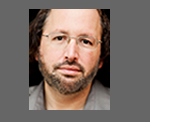TELLING STORIES BEFORE THEY TELL YOU:
A conversation with Paul Schrader
As a screenwriter, Paul Schrader has been responsible for some of the most seminal and controversial movies of our generation (Taxi Driver, Raging Bull and The Last Temptation of Christ). Although some of his directing efforts have been a combination of critical and commercial hits and misses, he has been responsible for
some edgy, uncompromising cinema which he was doing for years before the term “independent cinema” even arose. His directing has been criticized for being too intellectual, calculating to the detriment of emotion. But like the European art cinema he so admires (he was a former film critic), his style, at its best, challenges the viewer, forcing them into an active role to fully experience his films.
His latest directorial effort of his own adaptation of the Russell Banks novel Affliction stars Nick Nolte, Sissy Spacek, James Coburn and Willem Dafoe. Like Taxi Driver, Affliction deals with a character who is near a breaking point, ready to explode into violence. And like, The Sweet Hereafter, the other recent adaptation of a Russell Bank's novel, the setting is a stark and cold land which adds to the immediacy of the story. Told after-the-fact by his brother, Affliction is a story of a man, Nolte, who gradually loses himself as each of his roles are stripped away: father, husband, public servant, son, lover. The force of Nolte's existential and psychological breakdown is buttressed by a mythological resonance as Schrader shows that it is the affliction of a legacy of domestic violence which leaves Nolte somewhat unresponsible for his predetermined fate.
Tell me about your idiosyncratic path to becoming a filmmaker.
I was forbidden to see films as a child as an article of degree of the (Calvin) church. Because I didn't see films as a young man, I came to films as a college student. Essentially I came to the European cinema of the 60's. I was really attracted not only by the films, but by their forbiddenness. In many ways it was a luxury that I could be both a rebel and an artist. I didn't need to go out and vandalize buildings; all I had to do was see movies. In order to see many of the films I had been reading about, I took a course at Columbia University in the Summer of '66. There, through luck and coincidence, I ran into Pauline Kael through someone I had met, and the upshot of all that was that she became my mentor and got me into UCLA film grad school. And got me on the road to becoming a film critic.
Before that I had been a pre-seminary student at my church college. Then I was in Los Angeles, writing film criticism, writing a book of film aesthetics, editing a magazine, and became one of the first fellows at AFI. And then I hit a point in my life where nonfiction wasn't really addressing my concerns, or rather, my needs. And I knew I had to make the switch from nonfiction to fiction. I had to tell these stories before these stories started telling me.
Coming to films as an adult, how does that change your perspective? How does the way you look at or make movies differ from, say, Spielberg?
A filmmaker, like anybody, never forgets his first love. And my first film love was intellectual cinema: Bergman, Antonioni, Bresson, Godard, Truffaut. In a way the rest of my career circles around my first love and is informed by it. For many other directors my age, their first love was musicals, westerns, other forms of films aimed at kids. This doesn't mean that they are lesser filmmakers or more trivial filmmakers. It just means that they just have a different referential base. I don't feel the need to make the movies I loved as a kid because I didn't see any.
There seems to be recurring themes of redemption and martyrdom in your work. How does your religious background inform the stories you tell?
No matter how fast or far you run, you never outrun your childhood. I was raised with certain concepts, that life has meaning, actions have moral consequences, that you will be called into judgment for the value of your life. And that there is a difference between the right and wrong thing to do. That stuff never leaves you. You can be
living in a monastery in Tibet, and you'll still have that computer program (in your brain). You can't reprogram yourself. It will always be there. I try not to put it in an obvious manner, because I know it will be there anyway. In the film that Scorsese is shooting now, I intentionally took out a lot of the religious references of the book we adapted, because I knew Marty and I had done this so much. It was time to lay off it, because it was going to find its way in anyway.
How did you make the jump from critic to screenwriter?
I was doing part time reading for Columbia. At that time, it was $5 for a script, $15 for a novel. I was picking up a little extra change at the time doing coverage. So I had an idea what a script was. I had written a sort of practice script that went nowhere, so I had given it some thought. I had an argument with Pauline Kael at her home at Christmas time. She had wanted me to take a reviewing job on a paper in Seattle. When I asked her for some time to think about it, she said no, and then I made the decision that I had to start thinking about being a screenwriter. Then a number of things happened in my personal life, and it collapsed. My marriage broke up. I had a contretemps with the people who were running AFI, and I had to leave. I was broke. I didn't have any place to live. In this period I started drifting and wandering about in my car. It was out of this, the metaphor for Taxi Driver occurred. I wrote it all very quickly. I wrote it essentially as therapy. And when I actually came to writing the script, all elements of calculation were put aside, except that element of calculation that says you must communicate. But the other elements of how to be commercial or how to sell something I wasn't thinking of. I wrote a couple of drafts in ten days, just wrote continuously.
So in many ways I came to screenwriting for all of the best reasons. I came in as a form of self-therapy, I came in because I had no choice, I came in because I needed to do this to save myself. And I'm very thankful I walked in that door. I always bear that lesson in mind that art and screenwriting are functional. It can help you see
certain life crises in perspective. It can help you see life in perspective. And you can take this and show it to somebody else. And they too can have the same awareness that you were brought to. I really believe that art is functional in the same way that tools you use to build a house are functional.
What was your formal film education?
I went to grad school at UCLA in '68. Coppola was there the year before which was the beginning of the film school mentality. At the same time I was at UCLA, Lucas was at USC, Scorsese was at NYU. That was the birth of that mentality of the generation that came out of film school.
How was film school different then from now?
It wasn't just film school. It was film school at a certain time and place. The social hits just kept on coming. You had civil rights, you had the women's movement, the gay liberation, the sex, the drug revolution. It was an enormously churning social environment all wrapped up in the rubric of the counter-culture. And heated by the
anti-war movement which made everything seem real rather than theoretical. People's lives were actually being changed by the reality of the draft and the conflict. It was a wonderful time to be alive. So it wasn't just film school. This film school generation isn't being informed by the social issues anymore, because the culture isn't being informed. So the driving factors behind story-telling at this time are commercials and music videos. In my generation, it was film study. For the generation before me, it was live television. Before that it was theater. Before that it was newspapers. There's always a background influence.
When you sit down to write an original screenplay, where do you begin?
At any given time in your life, there are a number of problems running around. Problems that have a lot to do about where you are in your life cycle whether it's a mid-life crisis, problems with parents or children. You're always looking for metaphors that will somehow address that problem. And once you find that metaphor, particularly if you've written as much as I have, it's like a factory is standing there, fully manned, ready to go. All it needs is the raw material. The metaphor is the raw material. Once they get that, they can go to work.
But your last few projects have been adaptations?
About four years ago, I ran into a little dry period. Like so many others I turned to books. I did some adaptations where I originated the projects: Touch and Affliction. For about a year now I sort of fell back into the groove and have been doing a lot of writing again. That feeling of not having anything original to say has sort of gone away. (chuckling) I think I'll be good for a couple more years.
It goes through cycles.
Yeah, you just don't have an original script every year.
What are you writing now?
Right now I am outlining an idea. The metaphor first occurred to me four or five years ago, but I didn't think I was old enough to write it yet, but just this summer I realized now was the time to write this one. So I started outlining it now. I do a lot of outlining in lieu of writing, so by the time I come to writing I know it's going to work.
What attracted you to Affliction?
I picked it up at a bookstore. The first line of the book grabbed me right then and there which is also the first line of the film. I was very much captured by the narrative gimmick of it, the complexity of the characters and the use of the language. So I optioned the book, wrote the script, and over a period of years, I was able to raise
the money.
How long did that process take?
Oh, six years.There's a point in Affliction where Nick Nolte's character is in the lowest point of his existential crisis, and then the film immediately leads him and the audience back to the mystery subplot. It occurred to me that that parallels your entire relationship to genre. I don't think of you as the guy who does boxing bio-pics (Raging Bull) and horror flicks (Cat People).
What is your relationship to genre?
Genre is a very, very useful tool, because it sets in motion a certain set of expectations that you can use and that you need to respect if you are going to use them. There is a little bit of the mystery genre in Affliction: a small-town cop thinks a hunting accident is a murder. I use it to get the audience to a place so that I can drop what has seemed to be the plot and reveal it to be irrelevant, so what had seemed to be the subplot can take its place.
As Nick Nolte's character loses touch with reality, the demarcation between what's real and what's in his head begins to blur. How did you deal with this stylistically?
There were several levels of reality. There were his conspiracy theories which were in black and white, and there were his memories which were in a highly grainy color, but those were the only things technically.
But isn't there a point where the point-of view changes?
The important thing to remember is that it's a story that is being told to you. And the teller is as important as the story being told. In many ways, the narrator is the main character. He tells you right at the beginning in that telling this story he tells his own story as well. But he never tells us his story. His story is left up for you to surmise.
But it is a story of both brothers.
But what he doesn't tell is as important as what he does tell. You can see there is a certain denial about mistakes he has made.
Like his complicitious role in his brother's decline.
In an essay you wrote years ago, you quoted one of your favorite filmmakers Bresson, and I'm paraphrasing: “In art, there must always be a transformation.” What is the transformation in Affliction?
In films I have written, I tend to end with a grace note. There is no grace note in this film for the Nolte character. It is kind of a predetermined world, predetermined from the first line of narration. The one whose life is left in flux is the narrator who tells you why he can't let it go. He hopes his brother died, but he must go on. In fact he reveals himself as the character of the piece who is capable of transformation.
Tell me about the new Scorsese project with Nic Cage, Bring Out The Dead?
I'm done; they're shooting it. It's about a paramedic in New York City. A fellow who drives around at night on the cusp of social decay. (I laugh) So he's not unlike the taxi driver, but he is 'cause he's on God's team now. He's out there trying to save lives, but he's still going crazy. It takes place on a long three day weekend. He's
hallucinating by the time we meet him. Certainly Marty and I are aware that it will be compared to Taxi Driver, so we tried to make it a bookend rather than a remake.
Did Marty bring you into the project?
Marty and I decided about ten or twelve years ago not to work together anymore and just to remain friends, and not press a situation which was becoming increasingly unpleasant in terms of ego clashes. We'd have dinner once a year and keep in touch. We were having dinner a year ago, and he brought it up to me reluctantly. And as
soon as I read the book, I realized why he had. It was a natural for me and rather natural for us.
Tell me about your collaboration with Marty.
It's not really that much of a collaboration. There are a number of conversations, but at this juncture, and with this kind of material, we can pretty much finish each other's sentences, and we know how we're each thinking. It's just a matter if we feel we're on the same page, I take off at work. He was in post-production on Kundun, which was fortunate for me, because he didn't have time to micro-manage the writing, so after a short discussion at dinner and one ten-minute phone conversation, I just went off and wrote it.
How are writing and directing different?
Literary logic and visual logic are very different. An image is an idea in a much different way than a word is an idea. When you write, you think of the traditional rules of writing: theme, plot, character, dialogue. When you come to direct, you have to transform that literary logic into visual logic. The word chair is not the same as the
image of a chair. You have to translate one form of logic into the other. That's why when I write a script, I never think of the visual logic. I try to stick to the literary logic.
When you're ready to direct your own script, do you take the same approach that you would with another piece: sitting with it a while to find the architecture in it?
You look at it and you say: “Who the fuck wrote this? And how can I possibly save it.”








